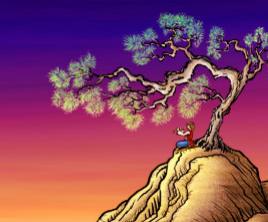abiding treasure
A few flies are brawling over sugar
Like it's treasure. Why should the sugar care?
A bird lands on the mountain, flies again.
Is the mountain bigger or smaller then?
#243: From Rumi's Kolliyaat-e Shams-e Tabrizi
Search word: work
I'm in a mood to get to work, to get started on projects that have been neglected. Only one first line in Houshmand's Rumi index contains the word work, so I glanced up at the line above and was intrigued by the flies and sugar. The verse doesn't make too much sense unless it's placed in the context of jealousy surrounding Rumi's relationship with Shams. The sugar could be Shams himself, or Rumi, or more specifically the special bond between them. Rumi seems to say that the attention paid to this couple and their love bond has no relevance at all to either of them or to their relationship.
It is an interesting pair of metaphors, this flies on sugar and bird on mountain. If we take the second metaphor first, we can interpret it two ways: the mountain is someone jealous over Rumi who is the bird paying the mountain a little attention, or the mountain is the loving couple that is unmoved and unchanged by insignificant attention being paid to it. In either case, no harm comes to the mountain or to the bird. Nothing serious has happened.
By contrast, in the first metaphor, the mountain is now tiny pieces of sugar and the flying creature is large in comparison and also joined by its fellows. The sugar is being consumed and does indeed have good reason to care. The jealousy of others did bring suffering down on both Shams and Rumi. The first probably paid with his life and possibly also with a cruel death by flaying. Rumi paid with the loss of his friend and uncertainty surrounding the disappearance. However, sugar remains sugar while being consumed and there is plenty more sugar where it came from. Rumi stayed true to his love for his friend and he stayed true to himself. Some essential things were not destroyed.
Sufism can be characterized as "the essence of essences" (see anulios for this quote from Idries Shah). All spiritual searches seem to be characterized by this striving for the essential, for something that is not or cannot be destroyed. It is sometimes expressed as a search for immortality. The alchemists called it the elixir of life and the philosopher's stone. One way or another, I'm pretty sure all the variants on the spiritual search would agree: the flies can pick at the sugar for all eternity but will not find the treasure that way, the mountain can draw one bird after another to pay it a visit but it will not become the treasure that way.
The Islamists and the universalists can also brawl over whether Rumi (or Sufism generally) is "really" an essential part of Islam or has flown free of it. Rumi himself has made it quite clear that he lies most comfortably outside these categories (see under my eternal strife). This doesn't mean he cannot lie uncomfortably within either.
Each morning the bird of my reflections lands briefly on Rumi's mountain and then flies off to other adventures. The mountain abides, unchanged.

adapted from image @ the hermit



0 Comments:
Post a Comment
<< Home